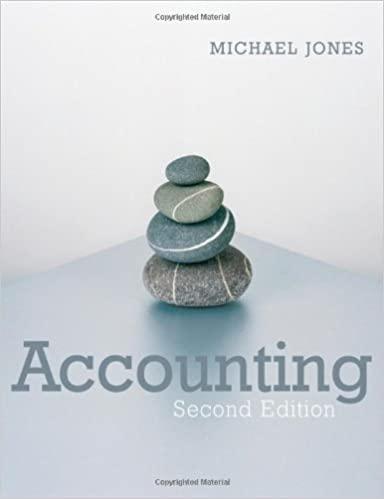Question
Question One: (25 marks) (X) Inc. purchased 80% of the outstanding voting shares of (Y) for $360,000 on July 1, 2017. On that date, (Y)
Question One: (25 marks)
(X) Inc. purchased 80% of the outstanding voting shares of (Y) for $360,000 on July 1, 2017. On that date, (Y) had common shares and retained earnings worth $180,000 and $90,000, respectively. The equipment had a remaining useful life of 5 years from the date of acquisition. Y's bonds mature on July 1, 2027. Both companies use straight line amortization, and no salvage value is assumed for assets. The trademark is assumed to have an indefinite useful life. Goodwill is tested annually for impairment. The balance sheets of both companies, as well as Y's fair market values on the date of acquisition are disclosed below:
|
| (X) | (Y) | (Y) |
|
| (carrying value) | (carrying value) | (fair value) |
| Cash | $800,000 | $245,000 | $245,000 |
| Accounts Receivable | $240,000 | $40,000 | $40,000 |
| Inventory | $60,000 | $45,000 | $50,000 |
| Equipment (net) | $900,000 | $80,000 | $72,000 |
| Trademark |
| $90,000 | $193,000 |
| Total Assets | $2,000,000 | $500,000 |
|
| Current Liabilities | $200,000 | $160,000 | $160,000 |
| Bonds Payable | $260,000 | $70,000 | $40,000 |
| Common Shares | $900,000 | $180,000 |
|
| Retained Earnings | $640,000 | $90,000 |
|
| Total Liabilities and Equity | $2,000,000 | $500,000 |
|
The following are the financial statements for both companies for the fiscal year ended June 30, 2020: Income Statements:
|
| (X) | (Y) |
| Sales | $640,000 | $240,000 |
| Investment Revenue | $8,480 |
|
| Less: Expenses: |
|
|
| Cost of Goods Sold | $300,000 | $160,000 |
| Depreciation | $81,000 | $34,000 |
| Interest Expense | $34,000 | $26,000 |
| Other Expenses | $5,000 | $8,000 |
| Net Income | $228,480 | $12,000 |
Retained Earnings Statements
|
| (X) | (Y) |
| Balance, July 1, 2019 | $960,560 | $48,000 |
| Net Income | $228,480 | $12,000 |
| Dividends | $20,000 | $2,000 |
| Balance, June 30, 2020 | $1,169,040 | $58,000 |
Balance Sheets
|
| (X) | (Y) |
| Cash | $1,200,000 | $365,000 |
| Accounts Receivable | $270,000 | $55,000 |
| Investment in (Y) | $319,040 |
|
| Inventory | $70,000 | $70,000 |
| Equipment (net) | $820,000 | $65,000 |
| Trademark |
| $85,000 |
| Total Assets | $2,679,040 | $640,000 |
| Current Liabilities | $350,000 | $332,000 |
| Bonds Payable | $260,000 | $70,000 |
| Common Shares | $900,000 | $180,000 |
| Retained Earnings | $1,169,040 | $58,000 |
| Total Liabilities and Equity | $2,679,040 | $640,000 |
An impairment test conducted in September 2018 on (X) 's goodwill resulted in an impairment loss of $10,000 being recorded. Both companies use a FIFO system, and (Y) 's entire inventory on the date of acquisition was sold during the following year. During 2020, (Y) Inc. borrowed $20,000 in cash from (X) Inc. interest free to finance its operations. (X) uses the Equity Method to account for its investment in (Y) Assume that the fair value enterprise (FVE) method applies.
Required:
Calculate the following:
1. The value of Common Shares appearing on (X) 's consolidated balance sheet on June 30, 2020 (3 marks)
2. The amount of Accounts Receivable appearing on (X) 's consolidated balance sheet as at June 30, 2020 (3 marks)
3. The amount of Current Liabilities appearing on (X) 's consolidated balance sheet as at June 30, 2020 (3 marks)
4. The net amount appearing on (X) 's consolidated balance sheet for Equipment as at June 30, 2020 (3 marks)
5. The amount of goodwill appearing on (X) 's consolidated balance sheet as at June 30, 2020 (5 marks)
6. What amount would appear as (X)'s investment in (Y) on its June 30, 2020 consolidated balance sheet? (3 marks)
7. The amount of non-controlling interest appearing on (X) 's consolidated balance sheet as at June 30, 2020 (5 marks)
Step by Step Solution
There are 3 Steps involved in it
Step: 1

Get Instant Access to Expert-Tailored Solutions
See step-by-step solutions with expert insights and AI powered tools for academic success
Step: 2

Step: 3

Ace Your Homework with AI
Get the answers you need in no time with our AI-driven, step-by-step assistance
Get Started


